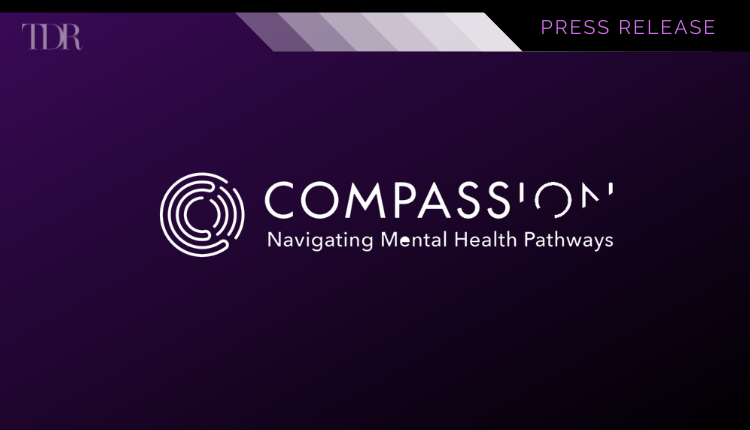
COMPASS Pathways presents largest ever study of psilocybin therapy, at American Psychiatric Association annual meeting
Positive data from phase IIb study shows potential of COMP360 psilocybin therapy in treatment-resistant depression
COMPASS Pathways plc (NASDAQ: CMPS), a mental health care company dedicated to accelerating patient access to evidence-based innovation in mental health, today presented positive data from the largest randomised, controlled, double-blind study of psilocybin therapy ever completed, at the American Psychiatric Association annual meeting in New Orleans*. The study showed that a single 25mg dose of COMP360 psilocybin, in combination with psychological support, was associated with a highly statistically significant reduction in depressive symptoms after three weeks (p<0.001), with a rapid and durable response for up to 12 weeks.
The randomised, controlled, double-blind phase IIb clinical trial was designed to understand the efficacy and safety of a single dose of investigational COMP360 psilocybin (25mg or 10mg), compared to 1mg in patients with treatment-resistant depression (TRD). 233 patients with TRD received either 1mg, 10mg or 25mg COMP360 psilocybin, in conjunction with psychological support from specially trained therapists. Symptoms of depression were assessed using the Montgomery-Åsberg depression rating scale (MADRS)**, a widely used and accepted scale for assessing depression; the MADRS assessments were made by an independent, blinded rater.
Key results:
- Depression symptoms: patients who received a 25mg dose of COMP360 psilocybin with psychological support experienced a highly statistically significant reduction in symptoms of depression after three weeks: the difference between 25mg group and 1mg group was -6.6 on the MADRS* depression scale at week 3, p<0.001.
- Durability: double the number of patients who received 25mg had a sustained response at week 12, compared to those who received 1mg (20.3% of patients in the 25mg group vs 10.1% in the 1mg group).
- Tolerability: COMP360 psilocybin was generally well-tolerated. On the day of COMP360 administration, headache, nausea, and dizziness were the only adverse events where a dose-related increase in incidence was evident and there were no clinically significant differences between dose group in vital signs or clinical laboratory tests observed during the study.
- Adverse events: In this study suicidal ideation and intentional self-injury were seen in all treatment groups (as is regularly observed in a TRD population), and the majority occurred more than a week after the psilocybin session. There was no mean worsening of suicidal ideation scores in any treatment group. Suicidal behaviours were reported at least 1 month after COMP360 administration for 3 non-responders in the 25mg arm.
David J Hellerstein MD, a Principal Investigator on the trial and Professor of Clinical Psychiatry at the Columbia University Irving Medical Center, said: “Treatment-resistant depression is one of the biggest challenges we face in psychiatry, and chances of success decreases with each treatment that a patient tries. It’s rare to see such positive outcomes of clinical trials in this disease area, which is why these results are so significant. I hope this represents a major step in finding new options for people living with treatment-resistant depression.”
Our mission is all about developing mental health innovations through scientific evidence, which is why we’re so honoured to present the largest study of its kind at the APA. In this study, a significant number of patients experienced improvement in their symptoms of depression after just a single dose of 25mg psilocybin with psychological support, with effects lasting for up to three months of the study. We now need to continue our research to understand if this can be replicated in even larger trials.
Dr Guy Goodwin, Chief Medical Officer, COMPASS Pathways
-Ends-
*The safety and efficacy of COMP360 psilocybin therapy in treatment-resistant depression: Results from a phase IIb randomized controlled trial. Guy M. Goodwin, Susan C. Stansfield, David J. Hellerstein, Allan H. Young, Ekaterina Malievskaia. APA: Abstract Number: 5301 Session Title: Poster Session 6
**MADRS = Montgomery-Åsberg Depression Rating Scale; response = ≥50% decrease in MADRS total score from baseline; remission = MADRS total score ≤10; sustained response = patients meeting the MADRS response criteria from week 3 until week 12
About treatment-resistant depression (TRD)
More than 320 million people globally suffer with major depressive disorder (MDD)1, the leading cause of disability worldwide and one of the fastest growing mental health illnesses2. About a third of these patients – 100 million people – aren’t helped by existing therapies and suffer with treatment-resistant depression (TRD)3. As many as 30% of these attempt suicide at least once during their lifetime4,5. TRD carries two to three times the medical costs of a non-TRD MDD patient, and patients with TRD have a higher all-cause mortality compared with non-TRD MDD patients6. The TRD population is by definition more difficult to treat and more likely to relapse than patients with major depressive disorder. In 2018, COMPASS received FDA Breakthrough Therapy designation for its COMP360 psilocybin therapy for TRD.
About the COMP360 psilocybin therapy phase IIb study
This randomised, controlled, multicentre, double-blind phase IIb trial is the largest psilocybin therapy clinical trial ever conducted, with 233 patients from 10 countries in North America and Europe. 94% of the patients had no prior experience with psilocybin. The objective of the trial was to find the appropriate dose for a larger, pivotal phase III programme, which COMPASS expects to begin in 2022.
The trial assessed the safety and efficacy of COMP360 psilocybin therapy at three doses: 1mg, 10mg, 25mg. A total of 233 patients enrolled in the study and were randomised and blinded into three arms comprising 79 patients for each of the 25mg and 1mg doses, and 75 patients for the 10mg dose. Patients were followed up for 12 weeks. The trial used the Montgomery-Åsberg depression rating scale (MADRS), a widely used and accepted scale for assessing depression; assessments were made by an independent, blinded rater. The primary endpoint was the change in the MADRS total score from baseline to week 3.
To view the original press release in its entirety click here

